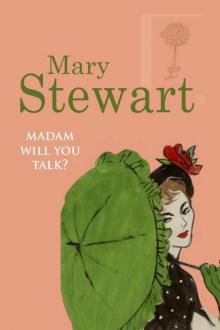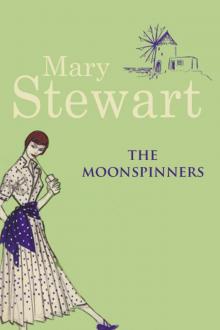- Home
- Mary Stewart
The Prince and the Pilgrim Page 4
The Prince and the Pilgrim Read online
Page 4
I wonder, she was thinking, when the figs come ripe on that tree outside the window? Those lizards were funny, weren’t they, the way they jumped and twisted together? I wonder if they have babies the ordinary way, or if they lay eggs like the newts in the pond at home? Eggs must be so much easier. Why do people have to do it the other way? Oh, and do you think we might go back in the same ship, with the captain who wore the gold earring, and used all those strange words to the sailors, and had that bird that talked, but Father wouldn’t buy it for me? Perhaps – if you spoke to him? I know you often do. And I’d love to have that bird, I really would.
Odd as it may seem, the Lady Alice, too, was talking to God.
For the more important days – saints’ days and Sundays – the duke and his daughter attended the great church of the Resurrection, but for their daily prayers they used the chapel of St Jerome, a small oratory set in one of the aisles of the church of St Mary, which had been built two centuries before by the Roman Emperor Constantine. This church, built of vast stones, was richly decorated, being the repository of the wealth of the thousands of pilgrims who nowadays flocked to the Holy City. It was set on the Haram, the vast plateau where originally, so men said, the temple of Solomon had stood, and where Jesus Himself had listened to the rabbis, and had overthrown the moneychangers. And from one of those tall towered corners the devil himself had shown Him all the kingdoms of the world.
Now all that had vanished, and the chiselled stones of the temples and law courts, evidences of the Roman rule of Herod’s time, had been pillaged for use elsewhere. But at night, with the new buildings bulking tall and black, and moonlight sifting down through pines and olive-trees into the narrow streets, it was easy to imagine all those stories that were told, ceaselessly told, to the pilgrims as they followed their Lord’s footsteps up the Way of the Cross, to the Pool of Bethesda under the temple gateway, to the Garden of Gethsemane, or even to the rock of the Tomb itself, hidden though this now was in the foundations of a church.
“And lucky to be there still for us to see,” said Ansirus, who himself took his daughter around to show her the holy places. “If they hadn’t stopped people bringing hammers in to get a piece of the sacred rock to take home with them, there’d be very little of the place left by this time. There are twice as many pilgrims now as when I last came here.”
The city was, indeed, packed to its limits, and these were very busy extending each year. The whole district round the Haram abounded in inns, hospices and monasteries where the pilgrims were lodged in varying degrees of comfort or austerity. Alice and her father were more fortunate than most: Ansirus had, on his first visit to Jerusalem with his wife, stayed with friends, Romans who had had in the past some distant connection with her family. When Rome itself had fallen to the swords of the Goths a century earlier, many Romans had been forced to flee with their families, and some of these had stayed and settled in Jerusalem. Most had prospered, building or buying houses among the wooded hills at the edge of the city. It was in one of these, near the foot of the Mount of Olives, that Alice and her father were staying.
Lentulus, their host, was a banker and man of affairs; he was making, it was said, a fortune out of property, buying rubble-strewn land and clearing it to sell for building. He was involved, it was also said, in the purchase of sacred items – not, of course, to attract the faithful to the city, but, once they had come, to satisfy their souls. Splinters of the True Cross, pieces of the reed that had held the sponge of vinegar, a thorn from the Crown, a drop of the vinegar itself in a vial – these marvellous relics were still available, at a price. Alice, being shown some of these items, viewed them with simple awe, but even at five years old was moved to wonder at the ever-renewed supply of nails and thorns that were on offer. A miracle, surely? Her father put her questions aside rather uneasily, with talk of faith and symbols which, not understanding, she promptly forgot. And there was no need for him to caution her, as he did, not to ask anyone else about such matters; she had no one else to talk to. Lentulus’ two sons, grown men and married, were away from home, one in business in Acre, the other back in Massilia. Lentulus’ wife, Matilda, was crippled with arthritis, and kept to her own chamber, leaving the running of the house to an elderly Jewish couple who kept very much to themselves. Alice had no companion of her own age. And since she spent all day visiting the sites of pilgrimage, and making the necessary round of service and intercession, and was sent to her bed soon after supper, it did not occur to Ansirus that she might need anything else to fill her time, or, if he had considered it (which of course, since Alice was a girl, he did not), her mind. When he did think about her – and he was a devoted father – he assumed that the child was having the best possible preparation for the life she would have to live. For a girl like Alice, life held two alternatives: she must marry some suitable man of her father’s choosing, and bear his children, or she must take her vows and retire to a convent, a chaste and holy Bride of Christ.
Devout though he was, the duke inclined towards the first alternative for his daughter. His beautiful little estate in Rheged, with the rose-coloured castle – Arx Rosea on the old maps – set in a deep curve of the Eden River, would need another master one day, and an heir; and of course a granddaughter or two would be welcome as well. Would, in fact, be delightful. So sometimes, watching that flower-like young face in church beside him lifted, rapt, towards God, he wondered if, by keeping her here with him through the whole ritual of pilgrimage, he was not driving her, headlong and far too early, into the arms of the Church.
He need not have troubled himself. With a child less intelligent, or less imaginative, it might have been true. But Alice, while of course believing all the stories, had acquired a faith that worked at the simplest – and most profound – level. She was easily able to accept the holy apostles, the saints, and the Lord Jesus Himself, as people who had walked here and done their wonders – magic or miracles, what was the difference? – and who might very well be met again one day. Of course there had been the Crucifixion, but for the pilgrims the strongest emphasis was on the Resurrection, the happy ending, as in the stories that Alice liked best.
Meanwhile life in Jerusalem surrounded her, pressed on her, excited and interested her. There was so much happening, so much to see; the carefully irrigated gardens (think of the rain at home!); the towers where storks nested and swallows darted and twittered all day; the lizards and tiny scorpions, the coloured birds (five for two farthings?); the baby camels trotting after their dams along the narrow souks, the goods for sale in the stalls, the streets of the coppersmiths, rug-makers, linen-sellers; the children playing in the dirt, the robed riders with their beautiful horses.
And Jesus, who had loved Jerusalem too? Some day He would be back here again, walking these streets, looking at all the new buildings, talking to the people and stopping to speak to the children; she only hoped that it would be when she and her father were here on pilgrimage. There would be plenty of chances; the duke had vowed, she knew, to make a pilgrimage every third year or so for his soul’s sake …
And some three years later, when she was eight years old, and back in Jerusalem with her father, it happened.
He came walking along the narrow, stony lane which lay just beyond the garden wall.
Lentulus’ villa was at the edge of the city, with fields beyond – what they called fields, here in the Holy Land; stretches of stony earth with sparse blades of grass in spring, and thin white and yellow flowers like daisies, and the red anemones that her father had told her were the lilies of the field. In summer there was neither grass nor flowers, and the shepherds took the flocks further and further afield to look for pasture.
And this was what this man – Jesus already in Alice’s mind – seemed to be doing. He was not walking the city streets surrounded by his disciples and talking to the people; he was making his way slowly along the lane that led away from the town, and he was knee-deep in sheep. He had a crook in one hand, and across his should
ers lay a lamb, its four legs loosely gathered into his other hand.
The Good Shepherd. Alice recognised the picture she had seen of him, even though the young man himself bore very little resemblance to the paintings and tapestries in the churches. Even to an eight-year-old, who looks on thirty as elderly, and forty as decrepit, this man was young. No fair hair and neat little beard, no white robes, and certainly no halo. Just a thin young man, dark-haired and dark-eyed, his cheeks shadowed with a few days’ growth of beard, and dressed in a brown kaftan girded with a knotted red cord. His feet were bare.
The sheep called and crowded close to him. He saw Alice on her perch at the top of the garden wall, in the shade of the tamarisk tree, and looking up, he smiled.
That made it certain. Alice said, a little breathlessly, though it was not possible, in the blazing sunshine, with the noise and the smell of sheep all around, to feel awe: “You did come back, then! I knew you would!”
He stopped, leaning on his crook. The lamb on his shoulder made a small sound and he slanted his head, caressing it with his cheek. “I come this way often.”
Though she had spoken in Latin, he answered her in her native tongue, but that was no surprise. He would, of course.
“And you, little maid?” he said. “You are a guest here, I think, a pilgrim to my city. It must be very different from your home in Britain. How do you like it, here in the land you call holy?”
“I do like it, a lot. But I was wondering –” began Alice, then was suddenly seized with a shyness that was normally foreign to her. What in fact did one say to someone who had come back from the dead, and to a place where he had been so cruelly killed? She swallowed and was silent.
“You were wondering?” he prompted. He had very kind eyes, which were still smiling, but she found herself quite unable to go on with her questions.
“Oh, just about the sheep,” she said quickly. “Those long legs, and the funny droopy ears. They’re quite different from ours. And the ones we have at home in Rheged are special. They’re little, with furry legs and blue fleeces, and they stay in the hills all winter. We don’t have to move the flocks about like you do. Where we live there’s always plenty of grass.”
“I know something of your country.” Of course he did. “It must be beautiful in all the seasons.”
“It is. It’s lovely. You will come there one day, won’t you? People say that some day –”
“Lady Alice? Lady Alice?” The interruption came from Maria, her nurse, newly waking from a nap in the sunshine, and hunting the garden for her charge.
“Some day, I hope,” said the shepherd, and raising the crook in a gesture of farewell, he turned away.
Alice slid down from the wall and ran to meet her nurse, whom she astounded by her good behaviour for the rest of that day.
6
“Have you noticed,” said Alice, who was eleven now, and as pretty as a girl of that awkward age has any right to be, “that my father always starts talking about his soul when the wind’s in the north, and the castle’s full of draughts?”
She was talking to her maid Mariamne, who giggled.
“Well, it wouldn’t do if the wind was from the south, would it? As it is, we’ll get a good fast passage, and be in the sunshine before the end of April, God be thanked! It’ll be good to be home again.” For Mariamne came from a village barely two miles from Jerusalem. She had been taken into the duke’s service on the previous pilgrimage.
Alice gave a little sigh. “It was lovely, wasn’t it? The voyage out was best – you weren’t with us then, though – such good weather as we had, and all the places we saw – Rome, and Tarentum, and then staying with my mother’s family in Athens. You did see Athens on the way home. And then the pilgrimage itself … Of course Jerusalem’s wonderful, though there’s never a lot to do apart from – I mean, I know one really goes for the good of one’s soul, only –” The sentence died on something very like a sigh.
Mariamne’s hand paused in its task of stitching a new shift for her mistress. The needle flashed in the sunlight which, for March, was surprisingly bright, and, in Alice’s chamber which faced south, reasonably warm, though to Mariamne, even after nearly three years, the chill of the British winter still struck deep.
“Only?” she prompted.
“Oh, it’s just that I don’t want to leave home just as spring’s coming. Look what we miss, the primroses are coming out already, and my pony will drop her foal in June, and – well, but I suppose we might even be home again in time for that.”
“Home again by June? Oh, no, my lady, you’re forgetting. The sea trip alone took all those weeks, and I remember every one, being so sick as I was! You’ll never be home by June.”
Alice left her chair and crossed to the window. Sunlight slanted in over the wide stone sill, and the scents of early spring – earth and pine resin and budding trees and all the smells of growth – came sifting in on the mild breeze. She thought she could even smell the snowdrops that still lay in late drifts under the trees. She turned to smile at the other girl. For all the difference in their ages – Mariamne was some four or five years older than Alice – it was the latter, mistress of Castle Rose and its acres since the day of her birth, who often seemed the elder of the two.
She spoke gently, the adult breaking bad news and offering comfort. “I’m sorry, Mariamne. I’ve been wondering just how to tell you. My father doesn’t plan to go to Jerusalem this year. He talked with me about it yesterday, and it seems that the journey would be too dangerous, even by sea. Even Rome would be impossible, with the Emperor backing the Burgundians, and there has been no news from Athens since my great-aunt died. I’m sorry. I’d have liked to see Jerusalem again myself, and I know how much you were looking forward to going home.”
Since Mariamne had been handed into service by her family for a due consideration, and her status in consequence was, unofficially, not much better than a slave’s, she knew that her expectations mattered not at all, and that in condoling with her Alice was showing a kindness that she would have met with in few other situations. With the patience which was one of the strengths of her race, she said nothing, but went back to her work in silence.
“If things change,” said Alice, “I’m sure we will go again next time. And I promise to see that you go with me.”
“It’s no matter, my lady. You are too good to me. And indeed, I am very happy here.” The needle paused again. “But you said … I thought you said that my lord duke was planning a journey? For his soul’s sake, you said? And that you might be home by June? What is there, as near as that? Oh, yes, there’s the holy man up on Table Hill, or the Chapel Perilous where the High King’s sword was kept and drawn, but that’s hardly a Christian shrine, and your father wouldn’t want to go there. It can’t just be another ride to the convent where your lady mother lies buried – that’s hardly a pilgrimage, is it? Nine miles, ten? So where is there to go, besides Jerusalem?”
Alice laughed. “You sound just like me! Only one place in the world for you – Jerusalem for you, Castle Rose for me! But we’re both going to Tours.”
“Tours? Where’s that?”
“In Gaul. It’s in King Chlodomer’s country, quite a long way to the south. The king’s capital is Orleans, but Father says that Tours is a nice enough town. It’s set on a big river, the Loire, that runs through beautiful country, and very rich. It sounds lovely. He says that the old queen – that’s the king’s mother – spends a lot of time there, and she’s very devout, so the accommodation for pilgrims is good. Not that that is a consideration, of course.”
“Of course not,” agreed Mariamne gravely. “And if it’s far enough to the south, it might even be warm. So what takes the Christians to this city of Tours?”
“The shrine of St Martin. He was a bishop, I think.” Alice was vague. “Anyway, he does a lot of miracles. Father didn’t tell me much, but he did say that the old king, King Clovis, that was Chlodomer’s father, was baptised there. He turned Christ
ian in gratitude for winning some battle or other. Queen Clotilda was a Christian, and she persuaded him. I don’t know who he was fighting; they’re always at war over there, Father says.”
The duke had in fact told his daughter a good deal.
Men’s fears about the turmoil on the Continent following the death of King Clovis had been more than justified. As was the custom among the Salian Franks (“And a foolish one, as we see it,” said Ansirus), the lands which Clovis during a lifetime of war had conquered and brought under one central government, were divided after his death among his four sons. The eldest, Theuderic, son of one of the king’s concubines, inherited large territories in the north; Chlodomer, the legitimate heir, received the fertile lands along the River Loire; Childebert, the third son, took a broad swathe of coastal land from the Loire to the Schelde, while the fourth son, Lothar, was granted territory north of the river Somme, along with part of Aquitaine. The partition was far from equal, and the consequent quarrelling among the brothers made travel through the Salian lands dangerous, even for pilgrims.

 Madam, Will You Talk?
Madam, Will You Talk? Legacy: Arthurian Saga 1-4
Legacy: Arthurian Saga 1-4 The Hollow Hills
The Hollow Hills The Wicked Day
The Wicked Day The Last Enchantment
The Last Enchantment Wildfire at Midnight
Wildfire at Midnight The Crystal Cave
The Crystal Cave Thunder on the Right
Thunder on the Right Airs Above the Ground
Airs Above the Ground The Ivy Tree
The Ivy Tree Rose Cottage
Rose Cottage The Gabriel Hounds
The Gabriel Hounds Legacy: Arthurian Saga
Legacy: Arthurian Saga The Wind Off the Small Isles
The Wind Off the Small Isles The Moonspinners
The Moonspinners My Brother Michael
My Brother Michael The Prince and the Pilgrim
The Prince and the Pilgrim A Wlk in Wolf Wood
A Wlk in Wolf Wood Touch Not the Cat
Touch Not the Cat The Little Broomstick
The Little Broomstick Thornyhold
Thornyhold This Rough Magic
This Rough Magic The Stormy Petrel
The Stormy Petrel Wicked Day
Wicked Day Hollow Hills
Hollow Hills WILDFIRE
WILDFIRE Stormy Petrel
Stormy Petrel Legacy
Legacy Crystal Cave
Crystal Cave Last Enchantment
Last Enchantment